FORT POLK, La. -- Prestige, honor and integrity are just words without the blood, sweat and tears to back them up. These are just a few of the characteristics of the Army's Expert Field Medical Badge, which backs up its reputation as an award that recognizes exceptional competence and outstanding performance by Soldier medics. That commitment to excellence translated into two weeks of intense training, testing and physical demands that represent the job of a combat medic.
The event began June 16 with acclimating the Soldiers to the parameters of each task. Master Sgt. Bennie Jordan, S3 noncommissioned officer in charge, 115th Combat Support Hospital, said candidates were brought through the testing lanes each day and told what was expected of them. "Everybody understands that these are the same guidelines across the board and everyone is graded according to the same standards," said Jordan.
Keeping the testing fair is Capt. Henry Schnedler, of the EFMB test control office for The Army Medical Department of the U.S. Army Center and School, Fort Sam Houston, Texas. He did this by walking the lanes with the EFMB test board to ensure everything was in order as he validated the test site. He said that everything he saw at Fort Polk was excellent. "We try to be the subject matter experts and a sounding board for any questions the board may have," he said.
Schnedler said he thinks the importance of the badge rests in the way the Army views it. "Having the badge gives a sense of confidence in that individual. When a Soldier sees the badge, he knows that medic knows his stuff."
Schnedler said the EFMB is tough to get and the average pass rate Army wide is around 20 percent. "This year, we've been working hard to get more test sites so that we have greater chances of increasing the badge numbers," said Schnedler.
The second portion of testing involved a written exam, day and night navigation courses, three combat lanes and a 12-mile foot march. The testing lanes include warrior tasks, medical evacuation and tactical combat casualty care. If candidates successfully traverse all these tasks, they will have the EFMB pinned on their chest.
That's the goal of Pfc. Sean Ammons, 115th CSH. Normally he works in medical supply, but he thinks it's important to broaden his horizons. Then he can have that combat state of mind and be prepared while deployed. "I don't want to have to rely on other people when something happens.
This way we'll all have the same training," said Ammons.
Looking up to and respecting senior officers who have the badge can motivate their Soldiers to follow in their footsteps. "There have been two or three NCOs that I have looked up to during my service and each of them had an EFMB. This competition encompasses a lot of different areas. So, I thought of this as a chance to train in those areas and possibly put myself in the company of those I respect," said Sgt. David Staples, Headquarters and Headquarters Co, 46th Engineering Battalion. "I take a lot of pride in what I do and I hate to fail."
There were 109 Soldiers that began the journey to acquire the badge. "It's human nature to drive and excel to be the best," said Jordan. He said the artillery rounds, smoke, patients screaming and the blood all play a part in exerting pressure on the candidates' psyche on the lanes. "They are hot, tired and stressed out and that's when they make the little mistakes that can make them fail," said Jordan.
Learning to deal with those types of situations is part of what earning this badge is about. "If a medic can't move, shoot and communicate properly, they aren't going to be an asset to their unit. Reacting to direct and indirect fire while moving from one point to the next without becoming another casualty is essential. The training is important for the purpose of the EFMB, but also because these are needed skills in Iraq and Afghanistan. Once deployed, throwing off some rounds down range for security is the secondary mission, but the primary mission is still to treat the casualties and get them off the battlefield," said Jordan.
Earning the EFMB badge shows professionalism and leadership, said Maj. Jeff Smith, chief of pathology at BJACH, tactical combat casualty care lane. "If I have Soldiers wearing this badge, it shows me they have the dedication and knowledge to earn that badge," said Smith. He said that's the kind of Soldiers others look to down range when "all hell's breaking loose."
Hell is a good description of the tactical combat casualty care lane. The scenario is set under Fort Polk's tall pines with an undergrowth of brush that can make it hard to traverse. The heat is intense, especially for candidates decked out in full warrior and medical gear. Sweat soaks their uniforms shortly after beginning the lane. The simulated reality of gunfire and explosions are a constant presence. Occasional smoke bombs create a hazy and difficult path for Soldiers to see.
Once through the worst of this bombardment of the senses, the basis of the lane comes into view -- wounded Soldiers. The candidate treats four of them simultaneously moving from one to another staunching imagined blood flow and stabilizing them for evacuation.
After finishing the tactical combat casualty care lane, Sgt. Carleton Thrall, 2nd Battalion, 30th Infantry Regiment, said this is the most challenging lane. "You have a lot of key medical tasks here. They're not grand or difficult, but you're doing so many of them under stressful conditions that it's easy to make mistakes," said Thrall.
Thrall said even if the Soldiers going out for the badge didn't succeed, the experience and chance to learn new things is tremendous. "Having a grader on this lane, another medic, always makes for a better experience. He's actually criticizing every step you take, checking the boxes for what you have to do, so you get a lot of growth out of it," said Thrall.
The EFMB course emphasizes never giving up. "When you look at a medic with the EFMB, you know that medic is not only smart enough to get the badge, but dedicated enough not to give up," said Sgt. Maj. Timothy Motes, command sergeant major of the 115th Combat Support Hospital. "A lot of these folks don't get the badge the first time. They may not achieve it until the third or fourth try. You see a medic who has achieved the badge after going through this torture three or four times and you know you have a sharp guy that has the tenacity to stick with something. I think that's why you don't see a lot of Soldiers with EFMBs."
The two weeks of intensely difficult events culminated an EFMB graduation ceremony May 27 at Honor Field. Out of the original starting field of 109 Soldiers, five earned the coveted award.
Brig. Gen. James C. Yarbrough, Joint Readiness Training Center and Fort Polk commanding general, opened the ceremony by commending the 115th CSH on a job well done. "We haven't done this (run an EFMB course) on post since 2003 because we have been deploying and worrying about what it takes to pull that off," said Yarbrough. "Today started with 109 Soldiers and finished with five. That attests to the fact that this is about the toughest, most distinctive badge we have in the Army, tougher than the Expert Infantryman Badge, I will tell you."
Yarbrough spoke about the importance of Army medics. "It takes a special kind of person to give care to wounded Soldiers on the battlefield. When the cry goes up, arguably nobody else is as important as you. The number one skill on the battlefield is saving American lives and you can't put a price on that," said Yarbrough.
To the 104 candidates that did not achieve their EFMB this go around, Yarbrough said, "If you never run a race, you'll never win a race. Know that this medic training is the most valuable you'll ever achieve. You're going to carry that into your next combat deployment and we're going to give you another opportunity to get this badge, so you keep after it and come back to try again" said Yarbrough.
The five graduating Soldiers are: Staff Sgt. Stephen Bonanni, Headquarters and Headquarters Battery, 5th Battalion, 25 Field Artillery Regiment, 4th Brigade Combat Team, 10th Mountain Division; Spc. Christopher McBurney, C Company, 94th Brigade Support Battalion, 4th BCT, 10th Mtn Div; Sgt. Jonathan Ortega; B Co, 115th CSH; Spc. Jonathan Reed, B Co, 115th CSH and Sgt. David Staples, HHC, 46th Engineering Battalion, 1st Maneuver Enhancement Brigade.
Staff Sgt. Stephen Bonnani took top honors. He was the Soldier with the highest go rate, highest written test score and the foot march winner. "I'm thrilled it's over and that I made it. This is my second try. None of it's easy," said Bonnani.
Succeeding on his first try at the badge, Spc. Jonathan Reed, B Co, 115th CSH, said, "It feels great to know that I'm done. It was an extremely difficult course. I've never done anything that challenging."
Reed's father, Jack Reed, also holds the EFMB badge. He received it in 1983 while also serving with the 115th. "I'm extremely proud of him. I think it was just as hard to get this badge today as when I got it, if not harder. I can tell he's on cloud nine," said Reed.
The younger Reed said his dad was an inspiration. "When I first entered the military, my dad gave me the last rank he wore, his badges and an award. The fact that one of the badges was an EFMB and he had earned it during his service in the same unit as me (115th) made me want to earn it. It's a phenomenal feeling to do something that my father has done. The fact that he's here to pin the badge on me is the most beautiful thing," said Reed.
Col. Patricia Darnauer, commander of Fort Polk's 115th Combat Support Hospital, ended the ceremony by thanking each of the commands on post that took part in making the event happen.
"Awardees, congratulations. You truly epitomize the 'expert' in the expert field medical badge. For the guys who didn't make it, there will be next time. You learned a lot. I met tremendous NCOs, Soldiers and leaders from every unit on this post. Fort Polk has great medics across the installation. I couldn't be more proud of them. Thank you for your participation today in support of the 115th and JRTC EFMB 2010," said Darnauer.
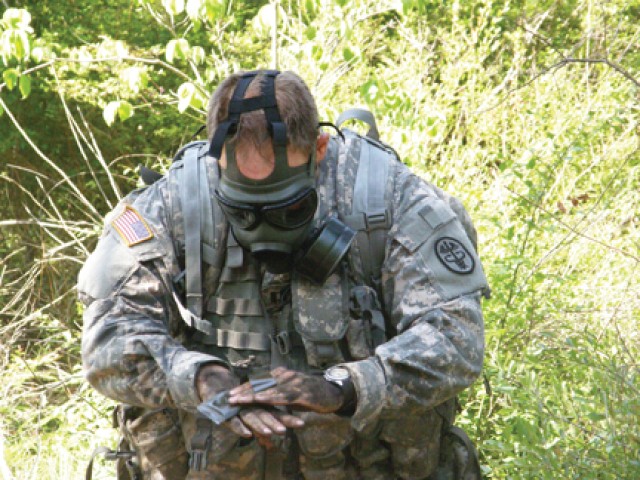
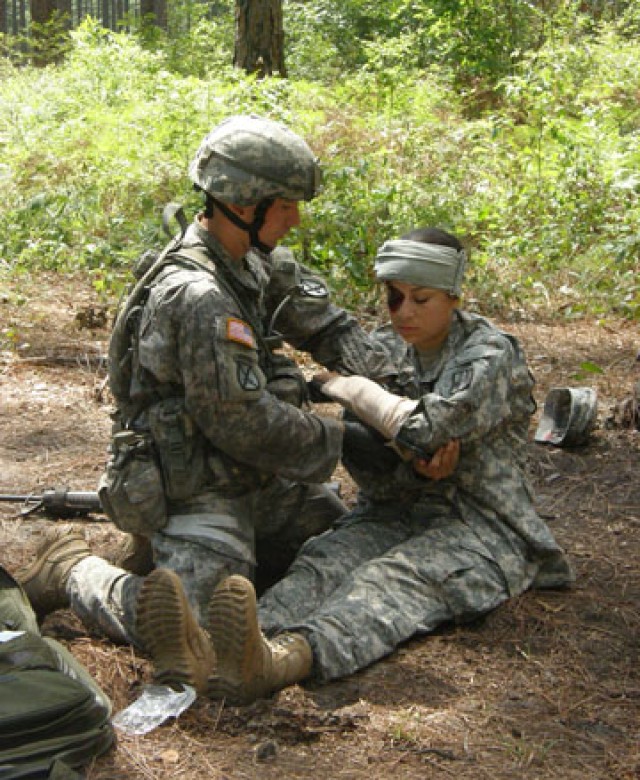
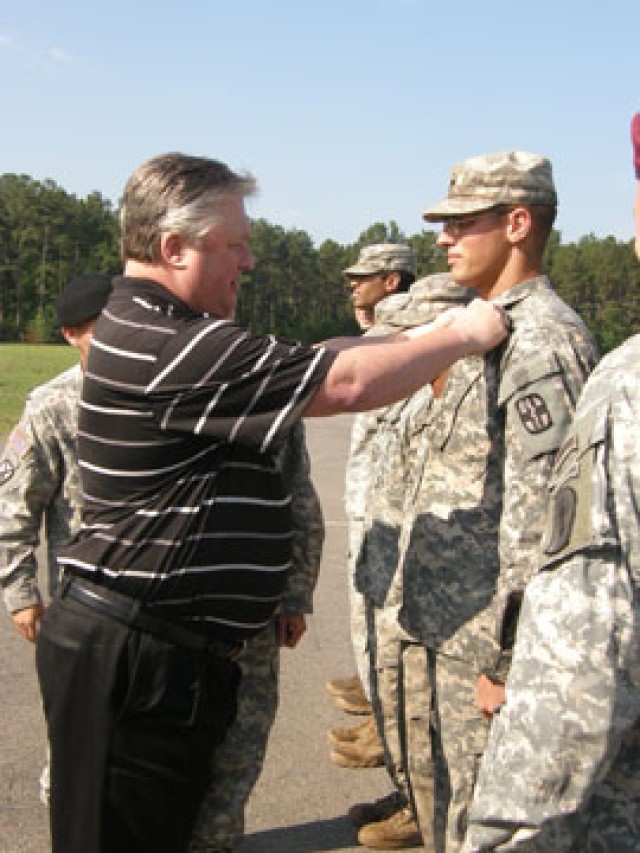
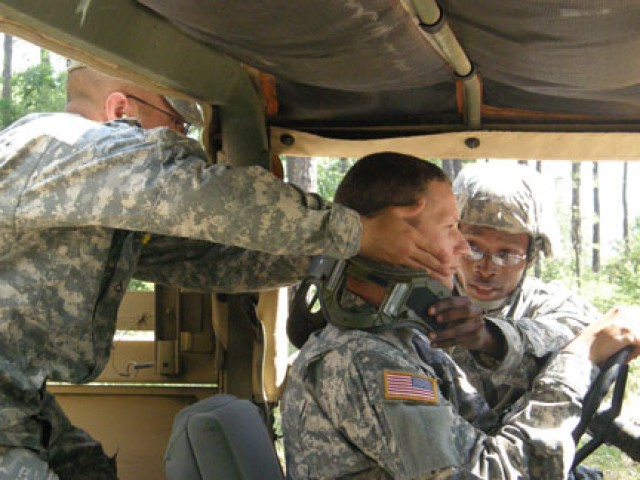

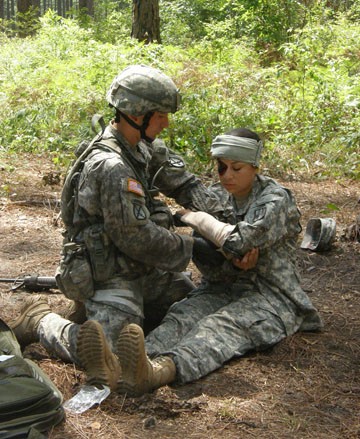
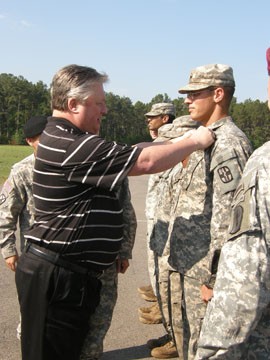

Social Sharing